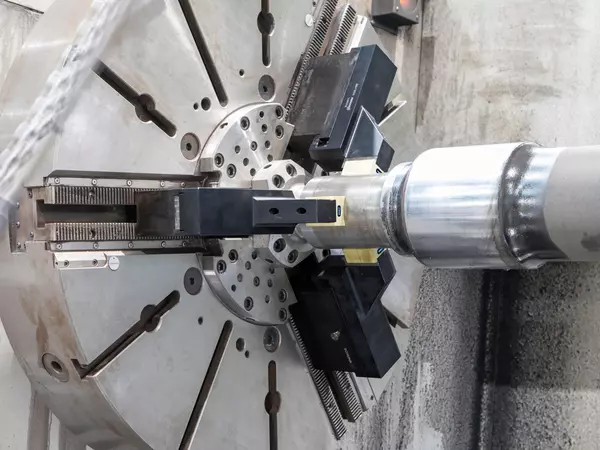



In the RailMaint workshops in Delitzsch, large items are moved – and great responsibilities are accepted. Rail vehicle bogies and wheelsets weighing several tons are inspected, machined, and made ready for safe use on the rails again. One fundamentally important workstation is the wheelset shaft repair on the Gurutzpe GLX 16.10.3 large lathe; the Spanish manufacturer has designed the horizontal lathe for machining strategic parts in the most demanding sectors. Shaft machining is highly demanding and safety-relevant. Enormous forces act directly on the axle via the wheel; in everyday rail operation, vibrations, shocks and permanent load changes place considerable strain on the shaft. A fracture can lead to catastrophes with far-reaching consequences – and can even cost lives. "A lot depends on this central machining station," says Holger Zocher from the Wheelset Technology division at RailMaint in Delitzsch. "The turning process must be absolutely precise. Safety and precision have top priority. But at the same time, repairs must be carried out efficiently. A certain throughput is required, as there must be neither delays nor backlogs in the plant. SCHUNK helped us greatly to meet all these challenges with the RAPIDO jaw quick-change system," confirms the Production Manager.

Absolute process reliability and shorter set-up times – to meet these requirements, SCHUNK has supplied the RAPIDO jaw quick-change system to Delitzsch for changing chuck jaws without tools. "This has really been a game changer here," says Holger Zocher, praising the improvement in work. "Set-up times are non-productive times and cost the manufacturing company money. Reducing these is very important for competitiveness." RailMaint purchased the Gurutzpe heavy-duty lathe in 2018; a lathe chuck with a diameter of 1.20 meters is installed on the machine side. The set-up proved to be a difficult and time-consuming task: A worker had to climb onto the machine via a specially built platform and a ladder in order to loosen the jaw screws and move the jaws – depending on the shaft diameter. "The chuck jaw, weighing around 40 kilograms, was handled by a crane, and had to be held and fastened at the same time by the worker, which was only possible with a second colleague. Three jaws per shaft, and it was repeated several times a day. From an ergonomic point of view, and for health and safety reasons, this was simply no longer reasonable," states the Production Manager. "It became clear that we had to do things differently and make improvements."
Holger Zocher did some research and came across the clamping technology expert SCHUNK. "SCHUNK is the market leader, the top provider, and its proposal convinced us," confirms Holger Zocher. The technology partner from Lauffen am Neckar provided the solution to the challenges faced by Delitzsch with the RAPIDO jaw quick-change system. Now, the jaws for shaft machining on the heavy-duty machine from Gurutzpe are changed with one hand and without tools – there is no need for scaffolding or a ladder because considerably less weight needs to be manipulated. A RAPIDO chuck jaw consists of a supporting jaw and an interchangeable insert. The RAPIDO supporting jaw is firmly screwed onto the grid of the lathe chuck – irrespective of the chuck brand – and remains secured there. It no longer needs to be re-positioned for machining different shafts. The RAPIDO interchangeable insert is simply clicked into place on the supporting jaw. It is turned for various customized clamping diameters and is inserted into the supporting jaw for the respective application – simply with a click: The supporting jaw and interchangeable insert are locked or unlocked by manually actuating a lateral pressure pin. The RAPIDO interchangeable inserts can be used universally and are easy to handle.
SCHUNK modifies the standard variants of the interchangeable inserts for the customer according to requirements and designs custom-made products in special fabrications for specific requirements – completely individually depending on the workpiece and clamping task. During set-up, there is no need to measure the correct position of the interchangeable inserts or to tighten the screws with a torque wrench. If the supporting jaw is removed, chuck jaws with conventional interfaces can further be used. The system is compatible with all commercially available lathe chucks.

For even greater process reliability, RailMaint uses RAPIDO interchangeable inserts and QUENTES plastic jaws: these clamping inserts made of glass fiber reinforced plastic (GFRP) enable a high coefficient of friction of approx. 0.3 to 0.4, ensuring full-surface force transmission and thus a firm, reliable hold on the workpiece. Thanks to these GFRP jaws, set-up takes place without clamping marks being formed on the workpiece surface. Imprints, inaccuracy, or marks on the shaft journals must be avoided at all costs. "In the past, we sometimes had the problem of the shaft spinning, which is really bad news when it comes to machining quality," reports Holger Zocher. The QUENTES plastic jaws, which are specially machined out to fit the respective shaft, enable higher torque transmission. Now everything is tight, and the shaft is not damaged."
The wheelset repair is carried out at defined intervals according to time and mileage in specific reconditioning stages. All machining data is documented – in the event of an accident or breakdown, all wheelset data and maintenance parameters can be traced. "Wheels and axes have to be reproduced exactly according to the original drawing, and all requirements have to be met, for example roughness, roundness, radii and all other dimensions," explains Holger Zocher. "There is no leeway here because safety is the top priority. The quality of the machining stands and falls with the quality of the workpiece clamping. The RAPIDO system has given us measurable advantages," confirms the Production Manager. Reduced set-up times, consistently high machining quality, greater productivity combined with improved occupational safety and ergonomics – the benefits for RailMaint are impressive.